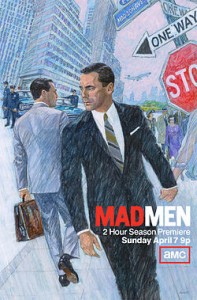[contextly_auto_sidebar id=”3RwcvvUk1AC4BkVM7TnYA96GH4qbLhTJ”]
SOMEWHERE between consensus and cliche is the idea that television is better than ever and has reached a new depth and intelligence. To optimists, The Wire, Homeland, Mad Men and so on show what’s possible even in these difficult times for culture.
so on show what’s possible even in these difficult times for culture.
My sense, as I looked into various economic models for Salon, here, is that the cable-TV model actually resembles older structures. Most of those quality shows don’t pay for themselves — they cost a lot to make and attract far fewer viewers than Duck Dynasty. They resemble the investigative reporting in your paper, which a chain department store indirectly pays for, or the piece of contemporary music your philharmonic puts on because of the packed houses for Tchaikovsky, or the modern dance piece that is effectively subsidized by the long Christmas run of The Nutcracker. In any case, those smart shows are vulnerable if cable providers stop “bundling,” in the same way your local newspaper or theater company suffers if people stop subscribing. If everything is “disaggregated,” only the most popular stuff survives. And a lot of good things disappear.
According to my Salon colleague Andrew Leonard, that’s already starting to happen, and it could have unpleasant consequences fairly soon. He gets into it here, summing up some recent changes, including the battle over Aero:
To recap: On Tuesday, Netflix lambasted the proposed Comcast-Time Warner merger, declaring it “a long-term threat” to the healthy ecosystem of the Internet. Comcast promptly riposted, dismissing Netflix as a querulous, hypocritical whiner with a shaky grasp on the facts. Then, on Wednesday, HBO sucker-punched Netflix by agreeing to stream HBO shows through Amazon Prime, and AT&T fired a warning shot across everyone’s bow by announcing its own plans to get into the streaming video business with a “Netflix-like” service. Also on Wednesday, the Supreme Court heard arguments in the case of American Broadcasting Companies, Inc. v. Aereo, Inc., which could end up resulting in the most influential high court ruling regarding how TV programs are distributed in decades.
A related war is being waged today over net neutrality, a topic most people probably feel they’ve heard too much about but don’t quite understand. The issue, in short, is whether a few large technology corporations will (further) dominate the web. One of my favorite economics columnists, Michael Hiltzik, explains the stakes here. He begins this way:
You couldn’t say the crime is being committed by stealth. Quite the contrary: Tom Wheeler, the chairman of the Federal Communications Commission, is aiming to slay net neutrality in broad daylight. The murder weapon is a proposal to allow Internet service providers to charge content companies more for faster access to their subscribers.

I have found that my Netflix streaming has been going slower and slower in the past year, as more people do it. If only we lived in the developed world, where internet speeds are 100 times faster than the U.S. Oh, the FCC chairman in a former lobbyist for the cable industry, I get it … but why did Obama appoint him?